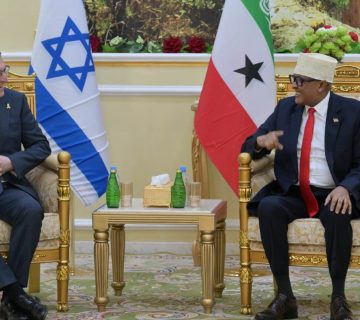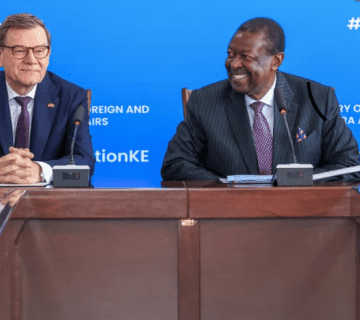King Philippe of Belgium arrived in the Democratic Republic of Congo (DRC) capital, Kinshasa on June 7, 2022, for a six-day visit. This was his first visit to the former Belgian colony, 12 years after King Albert II, his father and former king, visited the country. According to the Congolese spokesperson Patrick Muyaya, the engagement was geared towards a “new partnership” even as the visit came amid strained relations between the two countries. The current situation resulted from King Albert’s visit in 2010. Shortly after King Albert’s visit in 2010, Minister for Communications by then Lambert Mende openly came out and described the “unacceptable attitude of the Belgium political class to consider the Congolese problem as internal affairs”. This came at a time when DRC was facing unrest. He, later on, proceeded to say, “the colonizer to colonized relations is over”. Seven years later, President Kabila decided to suspend military cooperation with Belgium after Foreign Minister Didier Reynders criticized the appointment of DRC’s Prime Minister. Ironically, the suspension occurred at a time when the DRC was facing unrest that was propagated by political instability.
However, this is not to say that DRC and Belgium have not had a rocky past. The frosty relations date back to the colonial period when the Congolese suffered inhuman acts such as chopping off hands and being shot if they failed to attain the daily quotas assigned to them in the rubber plantations. These actions were a result of King Leopold’s harsh rule. The situation did not change for the better after Belgium took over the colony since millions are estimated to have died as a result of the harsh policies. In reflection of King Philippe’s recent engagement and as DRC looks to reestablish diplomatic links, the Congolese spokesperson reiterated that “we are not forgetting the past but looking forward to the future.”Thus, acknowledging their shared past that the people of DRC are yet to forget.
What the Congolese Expected from King Philippe’s Visit
In the early stages of his visit, the King expressed his regrets for the atrocities committed by the Belgians during the colonial era. In addition, King Philippe brought back an artefact formerly on exhibition in Belgium’s Museum. He also discussed the return of a tooth that belonged to former Prime Minister Lumumba after his body was dissolved in acid by a Belgian officer during the early post-colonial period. The King however refrained from apologizing to the people of Congo despite expressing his regrets.
As sincere as King Philippe’s regrets were, on one hand, they left the people of DRC expectant. It is evident that a clear apology was expected and is seen by some critics to be long overdue. While on the other hand, for Belgium, this address is tactful. Taking into consideration the rising pressure from the West as a result of the Black Lives Matter campaign, supporters of the campaign vandalized King Leopold’s statues. In a bid to show that he is also against racism, King Philippe therefore wrote a letter to DRC expressing his regrets for the atrocities committed by King Leopold.
Additionally, the main reason as to why King Philippe may not have apologized directly to the people in Congo is primarily because he is not ready to bear the cost that comes along with the apology. The most expected ‘cost’ by the people being reparations in monetary form to DRC. An example of a former colonial master that had to part with the cost of reparations is Britain. Just like the Belgians, the British were accused of torture in their colonies. After a petition was filed in Britain by Kenyan survivors from their harsh rule, Britain had to pay back a sum of 20 million pounds to the living survivors. Britain also supported the building of a memorial that was in honor of the fallen heroes. Two years after the ruling, 15 countries from the Caribbean presented a compensation plan to Britain. Just as many colonial masters had feared, the ruling had set the precedence for other countries to receive reparations. As a result of the observed trends, King Philippe has therefore not apologized to the Congolese.
The One-sided Benefits of Restored Diplomatic Relations
While it is evident that King Philippe values the relationship with DRC, he, however, does not want to amend the relations at the expense of the Belgian government carrying out reparations to DRC. If King Philippe’s tactic is successful and the relations are amended, Belgium is likely to gain more as compared to the DRC. This is because DRC is Africa’s largest producer of copper and the world’s largest producer of cobalt, a mineral which is projected to be of greater value in the future due to the rising demand for electric cars. According to the United Nations trade database, the main products exported by DRC to Belgium include diamonds, cobalt and cocoa beans. In the last 20 years, there has been a decline in exports from 774 million dollars to 108 million dollars. These statistics clearly show that a sector contributing to Belgium’s economy will keep declining should the relations keep straining. DRC on the other hand does not have a lot to gain. The notable support DRC has received from Belgium is an educational project that began in 2002. The project’s aim was to improve education standards by supplying textbooks to primary school students, an initiative that survived the test of strained relations.
Striking a balance between avoiding reparations and keeping DRC close would therefore be beneficial for Belgium in the future. However, just as Germany had to part with the cost of reparations after World War II, it will only be fair for Belgium to pay back the Congolese for the atrocities they committed against them.
Jeremy Oronje is a Research Intern at the HORN Institute
Photo Credit: Belgium’s King Philippe, accompanied by the President Félix Tshisekedi of the Democratic Republic of Congo greet dignitaries in Kinshasa on June 7, 2022 (Photo Credit: Arsene Mpiana/AFP/Getty Images)
The contents of this article are copyright of © The HORN Institute 2022. All rights reserved. Any redistribution or reproduction of part or all of the contents in any form and for whatever reason is prohibited. You may use the content of this article for personal reasons, but acknowledge the author and cite the website as sources of the material.



